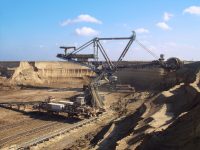Could U.S.-produced NdFeB be next?
Rare earth elements, such as cobalt and neodymium, are highly valued in modern, technology-driven societies for their ability to create magnets with unique characteristics. These elements are utilized in a wide variety of consumer and industrial applications from smartphones and televisions to electric cars. Dura magnetics utilizes neodymium-iron-boron (NdFeB) magnets in U.S. military, aerospace, and other applications.
As a percentage of mass, the rare earth metals make up only a small portion of the final magnet, yet they are critical to function and capacity. As a result, the industrial demand for these metals continues to grow. However, one clear obstacle stands between U.S. manufacturers and the purpose of these minerals in mission critical applications: most of their production is currently conducted in China.
Prior to its collapse in 2015, Molycorp, a mining company once headquartered in Colorado, was the sole U.S. producer of rare-earth metals. Since that time, China has become the biggest producer, holding 80% of the market. Second and third are Japan and the U.S. respectively, although Australia has increased production over the last eight years as well.
Throughout 2020, the United States has intensified its efforts to expand the mining and production of these crucial elements.
The effort to bring rare-earth production back to the U.S.
The U.S. government has allocated millions of dollars to bolster efforts to return rare-earth production to America. Through the past several years, and throughout the COVID-19 pandemic especially, it has become clear that the dependence on China to export rare-earth metals could be detrimental to U.S. security. To ensure future access to these materials, government funding has been set in motion in a variety of ways.
Several companies are receiving government support to drive this movement forward. As reported by the LA Times in September, the Pentagon is backing MP Materials to design a rare-earth processing facility at a site in California. MP Materials purchased the Mountain Pass mine in 2017 with the help of Shenghe Resources, a China-based company. However, the ore is being processed outside the U.S. until the facility is ready. The company hopes to be ready to begin domestic processing in 2022, a move that would keep the entire supply chain in the U.S.
The federal government is also assisting Urban Mining Co., an electronic waste recycler in Texas that manufactures rare earth products by recycling old electronics. Thus far, the company has received $29 million in support.
$122 million in additional federal funds could aid mining efforts
Recently, the Department of Energy announced $122 million in funding availability for the Carbon Ore, Rare Earth, and Critical Minerals (CORE-CM) initiative. This effort aims to develop public-private partnerships that will increase U.S. control of the rare-earth supply chain while also developing a market for “carbon-based products” from existing coal centers. These partnerships will “incubate innovated mining, beneficiation, processing, and purification technologies,” enabling the growth of U.S. domestic processing.
CORE-CM is sponsored by the DOE’s Office of Fossil Energy. Dan Brouillette, the Energy Secretary, specifically mentioned the administration’s dedication to developing rare-earth extraction technologies in the U.S. in the announcement.
“These projects … will help develop a viable domestic supply of these resources while creating new market opportunities for coal,” he said of rare earth minerals in a statement released in September 2020 by the DOE.
The project is anticipated to be a multi-year effort conducted in phases, with public-private “innovation centers” springing up in mining areas and coal basins. These centers will be focused on innovations regarding mining and processing of rare earth minerals.
Effect of U.S. production of rare earth minerals
As of this writing, there are no U.S. producers of neodymium, a key component of NdFeB magnets. Therefore, all magnets containing neodymium supplied by Dura Magnetics are currently sourced outside of the United States. However, the ongoing efforts toward domestic mining and U.S. production of rare-earth metals could greatly impact the ability to source U.S. produced material in the not too distant future. Access to this new supply chain will enable Dura Magnetics to fulfill defense and other contracts using neodymium sourced in the United States.
Your magnet experts
So long as the unique magnetic characteristic provided by rare-earth elements like neodymium remain a vital part of so many applications, including defense contracts, consumer electronics, and aerospace, demand will rise and prices may fluctuate. Dura Magnetics will continue to monitor the evolution of the domestic source of neodymium and provide transparency into pricing of rare-earth derived magnets, keeping customers informed every step of the way.
We’re here to help. Contact us to learn more about how we can be your trusted partner in custom magnet fabrication and design.

